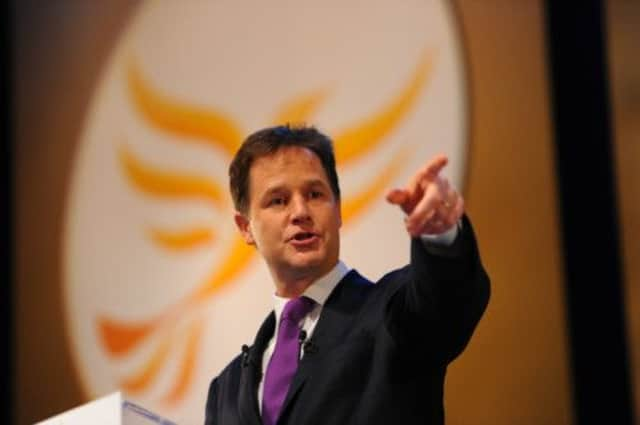John McTernan: Bring down curtain on conference season


We are already deep in the conference season. The Trades Union Congress last week. The Lib Dems have just finished in Glasgow. Then Labour in Brighton. And the week after that, the Tories. Seriously, what is the point of party conferences? I ask this as a veteran. I attended every Labour conference from 1987 until 2011. What was I thinking?
There are, in reality, two conferences. The pantomime on the floor; and the “shadow” conference where staffers, spinners, power-brokers, lobbyists and journalists do deals. The first is shallow and the second is never seen by the public.
Advertisement
Hide AdAdvertisement
Hide AdWhat you see on TV is vaudeville. A fight is “set up”, the leader struggles, but overcomes opposition – all of which shows “strength”. That’s not the quality you or I think it is – the thing that Muhammad Ali, or Hercules became famous for – it’s a creation, a pseudo-strength. The spinners and the press confect a conflict. First, the leader proposes a position that is “unpopular” with the party. Second, the press flams up a storm – the leader, shock horror, will be defeated. Third, with one bound the leader is free – the conference vanquished.
Seen it recently? I bet you have. Nick Clegg and Plan B. Alex Salmond and Nato. Tony Blair and almost any issue ever put to a Labour Party conference. But, do you remember the votes, the debates, the outcomes? Of course not. Your memory is doing its job – screening out the irrelevant. You have a life. You don’t watch party conference because you are not a pensioner, a student or on the dole. You don’t watch afternoon TV.
In 40 years, what are the moments that have changed the country? David Cameron winning the Tory leadership because he had memorised his speech? Blair calling for the abolition of Clause 4? No. The last real crackle of political fire was Neil Kinnock in Bournemouth in 1984 denouncing Militant – that speech marked the beginning of the fight that saved the Labour Party for Blair and Gordon Brown. (I sometimes wonder whether Neil thinks it was worth it. As the retiring Supreme Court judge says in The West Wing: “I waited all these years for a Democrat president, and I got you …”)
Party conferences are a game. There are no speeches with substance; no announcements of consequence; no fight worthy of the name – not even a showcase for the best talents of the relevant party.
What we have is a relic of the early 20th century, something that made sense in that world. It was a time when, on the one hand, you were still forming the discipline of a movement, so getting people together annually from across Britain allowed you to socialise them. And, on the other, you were transmitting messages and ideology to your activists. They came to conference – and returned home to transmit messages from the leadership. In the 21st century, the public, the press and the party have different expectations.
The modern analysis – the view of an educated, informed public – is that politics should not be merely the downward transmission of ideology and party lines. There should be a return path – an upwards transmission of experience, views and reflection from the ground, the grass-roots. This is the nub of the problem. Party conferences show the worst face of politics to the public. Sure, it’s a week when you boss the media agenda, when your speeches get reported. But to what effect? To showcase what is at best fakery, and at worst, division.
The Earl of Balfour famously said: “I’d rather take advice from my valet than from the Conservative Party conference.” In the 1920s, that statement was snobbish, de haut en bas, today it seems prescient. As one leading Labour figure once said to me about conference: “I wouldn’t let them walk my dog around the block – and I don’t even have a dog.”
What is the alternative? First, end annual conferences. The Americans don’t do it – they have conventions every four years tied to the electoral cycle. Other countries have biennial or triennial conferences.
Advertisement
Hide AdAdvertisement
Hide AdA big obstacle in Britain is cash. Conferences are a huge fundraising opportunity. As I mentioned, there is a shadow conference for staffers, journos and lobbyists. There is cash – and there is access, and a decent meal to boot. Myself, I’d pay good money not to have dinner with Vince Cable, but be assured there are many vested interests who believe that a cheap red and a rubber chicken with Vince are worth £1,000 or more.
Second, having broken the habit, do things differently. There is a brilliant new concept used by leading-edge organisations – the “unconference”. The principles are to deconstruct traditional talkfests. So, by all means hold a meeting or a convention – but don’t dictate the agenda. Structure a process whereby the topics for debate emerge – by collaboration. Scary? Yep. Creative? For sure.
And third, embrace new technology. By which I do not mean merely have a hashtag on Twitter. Social media channels allow the participation of a broader public and – the greatest liberation of all –people don’t physically have to attend your meeting. You can hold your conference over a month and all over the country at the same time. The weightless economy that abolishes global distance also enables a national political participation only dreamt of previously.
There is a huge appetite for political conversation in Scotland, and in Britain, and that conversation is happening all around us, but – to be blunt – at book festivals and on blogs. It happens nowhere near the traditional party political spaces. Parties must change or die.
• John McTernan was political secretary to prime minister Tony Blair